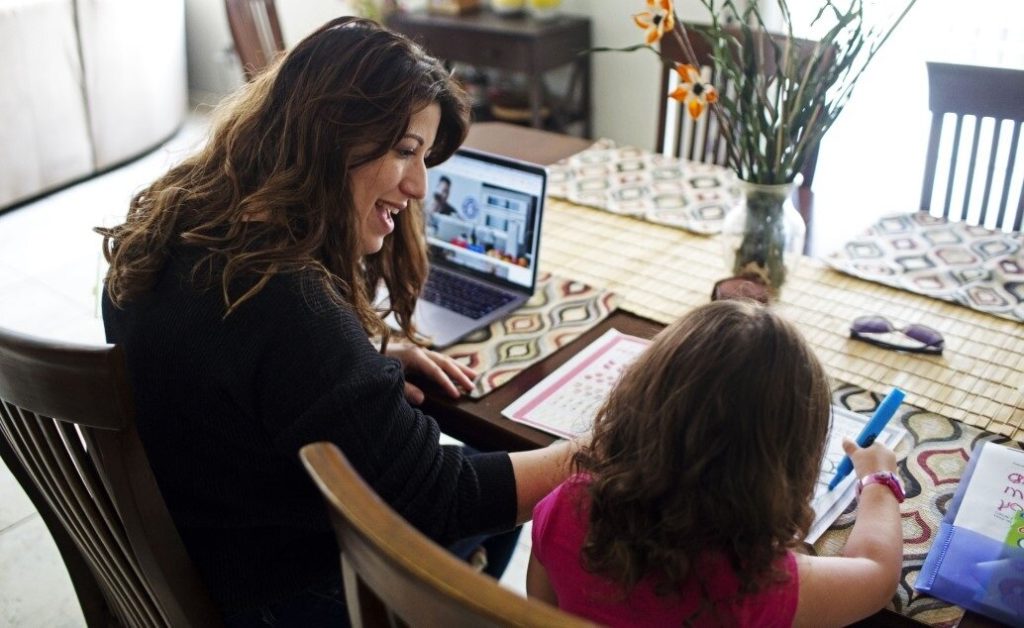
After completing my undergraduate degree through Gustavus Adolphus College (St. Peter, Minnesota) and a master’s program at Concordia University, St. Paul, with a small, familiar groups of fellow educators, I couldn’t imagine completing an online program without the in-person contact and communication I was used to. I mulled over the common concerns when it comes to online classes: Will I be supported? Will I make connections? Will I really learn?
When contemplating any significant decision, it’s helpful to weigh the pros and the cons to make the best determination. Here is my honest experience as an online student.
Pro: You can accomplish your coursework anytime, anywhere. This is the top reason students choose to go the online route. I work on coursework while my children are napping, in the car during dance class and on my lunch break. Instead of meeting somewhere at a particular time, I’m able to learn when it’s convenient for me. That flexibility made online education a feasible and appealing option.
Con: You can accomplish your coursework anytime, anywhere. Yep, the pro is also the con. Shortly after beginning my program, I took a vacation to Mexico. No work, no kids and no other responsibilities meant it was a prime time to get ahead on some assignments. Not necessarily how I would choose to spend my vacation, but I will say that if I had to do homework, on a beach in the sun was the way to do it.
Pro: It is more economical. Aside from the fact that ACE’s program was a fraction of the price of other institutions, there are no additional parking fees or required books to purchase. This, in combination with the time and gas saved traveling to a physical location, was an additional advantage.
Con: Life happens. Not necessarily a con, but if you’re not determined and focused, distractions can become overwhelming. It is essential to develop a schedule that works for you, and then it’s up to you to make sure you follow it. It involves saying “no” and turning down obligations you would otherwise happily accept. It changes your priorities and makes you reconsider what’s most important to you.
Pro: It will challenge you. In my classes, I’ve reflected on my personal and professional behavior, and thought more than I ever have about how to best reach every student. While it is undoubtedly the hardest I’ve ever worked in school, it’s worth it.
Con: It’s a lot of work. A lot. And there are times it seems like it will never end. But, just as I assure my students, that work is necessary in order for growth and learning to happen. This all comes back to time management and keeping things in perspective.
Pro: It forces you to make an efficient use of time. I am much more productive, and I will only spend time doing what is most important to me. Non-negotiables include time with my kids, adequate preparation for my students and homework completion. I appreciate every second I have and try to devote myself completely to the present activity. Everything I do is meaningful to me and either brings me purpose or will help me achieve my goals in the future.
Con: The lack of in-person communication. I imagine this is the complaint of most people deciding against online education. There are times I miss in-person discussions, but there are opportunities to develop those connections with people. I feel like my instructors have greater availability (e.g. nights and weekends) than they did in traditional education. I have participated in class Zoom conferences and virtual study groups, and while I understand it’s not the same, I have also communicated with instructors and classmates via phone and email. There are plenty of opportunities to connect with people and, as with most things, you will get what you put into it.
Pro: Through my courses, I have the opportunity to communicate with people all over the country and even the world. In my first class, a classmate’s greatest concern was reliable internet connection in the middle of Africa. Not only does this put things in perspective, it exposes you to a greater diversity of experiences. It’s helpful to connect with people who teach my content area in other parts of the United States, and to hear about the diverse range of teaching experiences. This results in meaningful and rich conversation that encourages critical thinking.
Con: A reliable Internet connection is essential. Typically, this is not a problem, but having a backup plan is probably a good idea. Staying on top of assignments is helpful in order to avoid a last-minute crunch, but there are usually public places that offer free WiFi if necessary. And escaping your at-home obligations can help you focus on an assignment without getting sidetracked by taking care of those dirty dishes in the sink or putting away the laundry. I am all about multi-tasking, but there are times it makes me less efficient, and I would accomplish more if I dedicated complete attention to one task at a time.
Taking on an educational program is only temporary. While the lessons will hopefully enrich and strengthen your instruction for the remainder of your career, the course of your online education will last a relatively short time and go by quickly. It’s like working out. Is it your top choice of what you’d like to be doing right now? Probably not. But, once you get started, it’s not that bad. You might even appreciate the process. And, once you’re done, you’ll feel an incredible sense of accomplishment. You’ll know you made the right choice.
If you are searching for an online program that fits your busy schedule, look no further than American College of Education. Explore all our graduate-level programs to find the one that fits your career goals.

